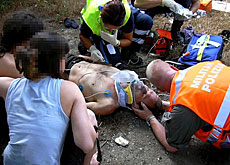
Trial starts over G8 bridge incident

The trial is underway in Nyon of two Swiss police officers accused of causing bodily harm by negligence to two people during anti-G8 protests in 2003.
One of the two protesters was badly injured after falling from a bridge near Lausanne after the rope to which they were attached was cut.
The key question for the court is whether the policemen knew that the man and the woman were attached to a rope during the protest on a bridge near Lausanne.
On June 1, 2003, a group of anti-G8 activists staged a sit-down protest on a motorway bridge at Aubonne, between the western Swiss cities of Lausanne and Geneva.
The aim was to stop delegates from reaching the G8 summit in Evian, in neighbouring France.
Martin Shaw, a Briton, and Gesine Wenzel, a German, were attached to a rope, which was suspended over the road from the bridge. The other members of the group had erected a barrier about 100 metres down the road to stop cars from reaching the rope.
The police soon arrived at the scene to disperse the protesters and allow traffic through. A police officer is then said to have cut the rope.
Shaw fell to the ground, sustaining multiple fractures to his back and legs. He survived but is unlikely to fully recover from his injuries. Wenzel was hauled to safety on to the bridge, but is said to have suffered post-traumatic stress for more than a year after the incident.
Both protesters were found guilty of obstructing public traffic in 2003. An investigation into the two police officers was dismissed through lack of evidence.
But Shaw and Wenzel appealed against their ruling, obtaining a court hearing.
Possible negligence
Judges at the Nyon Criminal Court in western Switzerland will now consider the case against the two policemen who are accused of criminal negligence causing bodily harm. The hearing is due to finish on Wednesday.
They will be looking into whether a police officer who cut the rope and his superior actually knew that there were two people attached to it and if there was an order to do so.
The protesters’ lawyer, Jean-Pierre Garbade, is convinced there is more to the incident than negligence and has called for the charge to be raised to endangering the life of another.
“From the moment that the police arrived and dispersed the demonstrators, who could no longer check on the safety of their two friends, officers were in charge of the activists who were suspended over empty space,” Garbade told swissinfo.
“All the police officers, except the two accused who deny it, knew that there were people attached to the rope.”
Acquittal
For its part, the legal team acting for the two defendants is demanding an acquittal.
“It has been established, I think, that my client did not know that there were two people suspended from the bridge,” Jacques Michod, a policeman’s lawyer, told the media last week.
The other policeman is alleged to have not told his subordinate that there were people attached to the rope.
According to his lawyer, Yves Burnand, the two men could not communicate very well, one being a French speaker and the other a German speaker.
A film of the incident is likely to be shown in court. Witnesses are expected to take the stand and transcripts of the police’s radioed communications should also be presented.
A verdict is expected by the end of the week.
swissinfo, Alexandra Richard and agencies
In 2003 two anti-G8 protesters were convicted of obstructing public traffic.
The inquiry into the two police officers’ conduct was dismissed through lack of evidence.
Shaw and Wenzel appealed against their ruling, obtaining a court hearing.
Almost three years after the bridge incident, the two policemen are to go on trial for criminal negligence causing bodily harm.
The protesters are demanding compensation from canton Vaud.
A summit of the world’s seven most industrialised countries and Russia took place in Evian, France, from June 1-3, 2003.
Anti-G8 protests were organised to coincide with the event.
Switzerland and France undertook joint security measures.
In Switzerland, police officers were drafted in from different cantons. 5,000 soldiers also assisted.
Switzerland’s security forces for the G8 amounted to around 10,000. France provided almost 20,000.

In compliance with the JTI standards
More: SWI swissinfo.ch certified by the Journalism Trust Initiative




























You can find an overview of ongoing debates with our journalists here . Please join us!
If you want to start a conversation about a topic raised in this article or want to report factual errors, email us at english@swissinfo.ch.